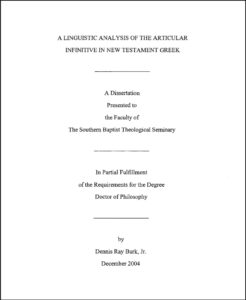
 A colleague recently ask me about Biraud’s treatment of determiners in Ancient Greek and its implications for the DP hypothesis (Determiner Phrase hypothesis). I had not seen the book in over a decade, so I put my colleague off until I could find a copy. I found one in a nearby library and it seems to confirm my vague recollection that Biraud (despite the sound of the title to English speakers) was not really discussing the issue that falls under the term “determiner” in English Linguistics.
A colleague recently ask me about Biraud’s treatment of determiners in Ancient Greek and its implications for the DP hypothesis (Determiner Phrase hypothesis). I had not seen the book in over a decade, so I put my colleague off until I could find a copy. I found one in a nearby library and it seems to confirm my vague recollection that Biraud (despite the sound of the title to English speakers) was not really discussing the issue that falls under the term “determiner” in English Linguistics.
Here’s the description of the book from its back cover along with my feeble translation. I am not fluent in French. In fact, I’ve never had a French class. What I can read in French is entirely self-taught, so the translation I provide after the French text is certainly open to debate! If you see any mistakes, please point them out, and I’ll make the necessary changes.
L’attique classique est riche en déterminants et la variéte des structures des groupes nominaux appelle une étude précise. A l’aide de quelques principes simples de description, empruntés pour la syntaxe à l’analyse distributionnelle, et pour la sémantique plus librement inspirés par diverses théories, l’auteur montre que cette diversité se laisse réduire à un système de quelques règles aux implications multiples, dont les écrivains anciens ont exploité toutes les possibilités expressives. Sont abordés en cours d’étude plusieurs problèmes de linguistique générale, pour certains desquels sont esquissées des solutions originales (le statut des déterminants d’identité es d’altérité, une possible hiérarchisation de la structure du syntagme nominal en fonction des apports déterminatifs…).
Ainsi non seulement cet ouvrage peut-il donner aux hellénistes une vision plus claire d’une question sacrifiée dans les grammaires alors qu’un mot sur six dans les textes est un déterminant, mais il peut aussi présenter quelque intérêt pour des linguistes curieux des résultats d’une approche systématique de la détermination en grec ancien et des probèmes qu’elle soulève.
Classical attic is rich in modifiers and the variety of the structures of noun phrases calls for a precise study. Using a few simple principles of description, borrowed from syntax for distributional analysis, and more freely inspired by various theories for semantics, the author shows that this diversity can be reduced to a system of a few rules with several implications, of which the ancient writers have exploited all the expressive possibilities. Several problems of general linguistics are addressed in the course of the study, for some of which original solutions are outlined (the status of modifiers of identity and otherness, a possible hierarchy of the structure of the noun phrase according to the contributions of modifiers…).
Thus not only can this work give Hellenists a clearer view of a question ignored in grammars although one word out of six in the texts is a modifier, but it may also be of interest to linguists curious about the results of a systematic approach to modification in ancient Greek and the problems it raises.
[Any mistakes in the translation are entirely my fault! Don’t blame Biraud!]
![]() The domain name greeklinguistics.com, which for some time now has worked as an alias for greek-language.com, will be out of service for a few days as we make the move to a more secure web server. I will be using the name greeklinguistics.com to set up the new server and test the site to ensure that everything works well before everything goes live there.
The domain name greeklinguistics.com, which for some time now has worked as an alias for greek-language.com, will be out of service for a few days as we make the move to a more secure web server. I will be using the name greeklinguistics.com to set up the new server and test the site to ensure that everything works well before everything goes live there.

 I have added Dennis Ray Burk’s doctoral dissertation “A linguistic analysis of the articular infinitive in New Testament Greek” to the
I have added Dennis Ray Burk’s doctoral dissertation “A linguistic analysis of the articular infinitive in New Testament Greek” to the  I would like to thank those of you who, over the last several years, have submitted suggestions for
I would like to thank those of you who, over the last several years, have submitted suggestions for 